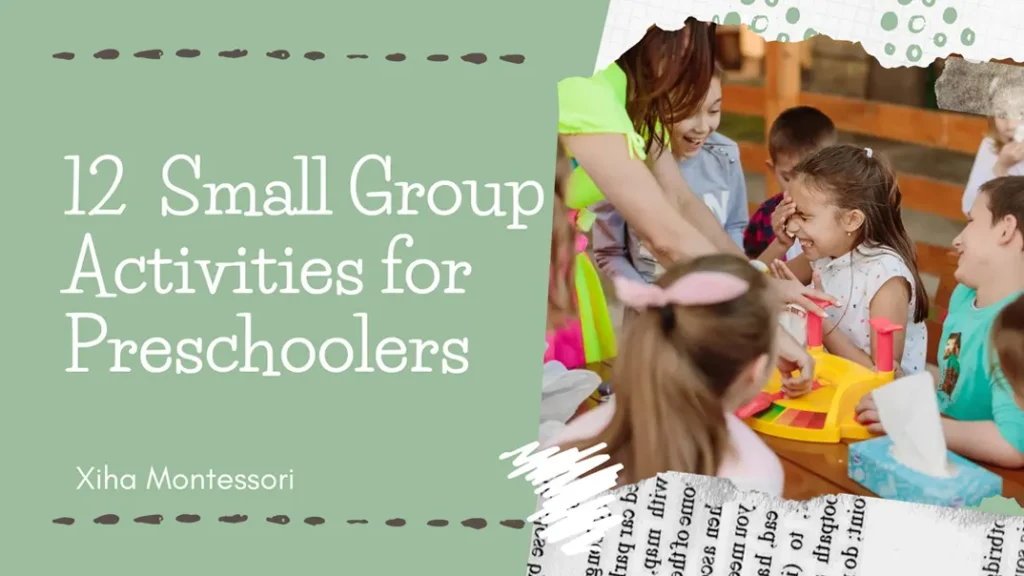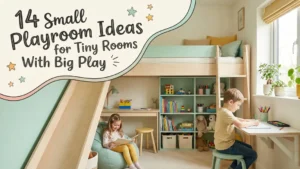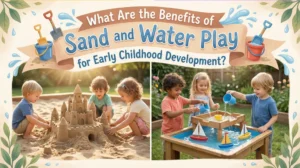Are you seeking fun and educational activities to engage your preschoolers in small groups? Small group activities for preschoolers may be the key to providing individualized attention and encouraging young children to work together. But which activities are most effective and enjoyable?
Small group activities are essential for preschoolers because they promote social interaction, enhance learning, and keep children engaged. Organizing activities in small groups allows children to receive more individual attention and participate actively, boosting their confidence and skill development.
Whether you’re a teacher, parent, or caregiver, these preschooler group activities are perfect for enhancing learning through teamwork, creativity, and exploration. Engage their senses with a nature scavenger hunt, challenge their problem-solving skills with a block-building competition, or encourage their love of storytelling with a small group session. These activities promote social interaction and enhance cognitive, emotional, and physical abilities. With our carefully curated list, you’ll never run out of ideas to keep your preschoolers entertained and engaged.
What are Preschool Small Groups?
Preschool small groups refer to a teaching strategy where children are divided into smaller groups for various activities. This approach allows for more personalized instruction and better interaction among children. Typically, each group consists of three to five children, making it easier for teachers to manage and engage with them.

Benefits of Small Group Activities for Preschoolers
Small group activities offer numerous benefits for preschoolers. They provide opportunities for children to develop social skills, such as sharing and cooperation, in a more intimate setting. Additionally, these activities allow teachers to tailor lessons to meet each child’s individual needs and learning styles, leading to more effective and meaningful learning experiences.
1. Personalized Attention
In small groups, children receive more personalized attention from their teachers. This individualized approach helps address each child’s needs, ensuring no one is left behind. For instance, a child struggling with a particular concept can receive additional support and guidance, while those who grasp it quickly can move on to more challenging tasks.
2. Enhanced Social Skills
Small group activities also enhance social skills by encouraging children to interact with their peers. In a smaller setting, children have more opportunities to communicate, share ideas, and work together. This interaction helps develop important social skills, such as empathy, cooperation, and conflict resolution.
3. Improved Learning Outcomes
Research shows that small-group instruction can lead to improved learning outcomes. Children are likelier to stay engaged and motivated when grouped according to their abilities and interests. This targeted approach allows teachers to challenge each child appropriately, fostering a love for learning and academic success.
4. Flexibility and Adaptability
Small group activities offer flexibility and adaptability in teaching. Teachers can easily adjust the pace and content of the lessons based on the group’s needs. This flexibility ensures that all children can progress at their own pace, reducing frustration and increasing confidence.
5. Greater Engagement
Children are more likely to be engaged in activities when they are part of a small group. The intimate setting allows for more hands-on and interactive learning experiences, making the activities more enjoyable and meaningful for the children.
6. Boosted Confidence
Participating in small group activities allows children to express themselves more freely and take on leadership roles. This boosts their self-esteem and confidence in their abilities.

How Many Children Are in Each Group?
The ideal size for preschool small groups is typically between three and five children. This size allows for effective management and interaction while ensuring that each child receives sufficient attention. Smaller groups can lead to more meaningful interactions and better learning outcomes, as teachers can focus on the needs of each child.
How to Group?
Grouping children for small group activities requires careful consideration of various factors. Here are some tips for creating effective groups:
- Ability-Based Grouping: Ability-based grouping involves organizing children according to their skill levels. This approach allows teachers to provide differentiated instruction, addressing each child’s needs.
- Interest-Based Grouping: Group children with similar interests to increase engagement and enthusiasm. Children who are interested in the activity are more likely to participate actively.
- Random Grouping: Random grouping involves assigning children to groups without considering their abilities or interests. This method encourages children to interact with diverse peers, promoting social skills and teamwork.
- Mixed Abilities: Combine children with different skill levels to encourage peer learning and support. This diversity helps children learn from each other and fosters a collaborative environment.
- Rotating Groups: Rotating groups involves regularly changing the group compositions to ensure that children can interact with different peers.
What Types of Activities Work Best?
Various activities work well in small groups, each catering to different aspects of a child’s development. Here are a few categories to consider:
- Sensory Activities: Sensory bins filled with rice, beans, or water beads can captivate preschoolers’ attention while enhancing their tactile senses.
- Creative Arts: Activities like finger painting, clay modeling, and collage-making encourage creativity and fine motor skills.
- Storytelling and Dramatic Play: These activities help develop language skills and imagination.
- Simple Science Experiments: Basic experiments such as mixing baking soda and vinegar can introduce scientific concepts fun and engagingly.
Fun Small Group Activities for Preschoolers
Here are 12 fun and engaging small group activities for preschoolers that promote learning, creativity, and social skills:
1. Cooperative Drawing
Gather a small group of children and provide them with a large sheet of paper and drawing materials. Please encourage them to draw a collaborative picture. This activity fosters teamwork, creativity, and communication skills as children negotiate and decide what to draw together.

2. Dramatic Play
Create a small dramatic play area with costumes and props. Assign roles and let children act out scenarios like running a grocery store or visiting the doctor. Dramatic play helps develop social skills, empathy, and language abilities.

3. Letter Matching Game
Prepare cards with letters and pictures of objects that start with those letters. Have children match the letter cards to the corresponding picture cards. This game enhances letter recognition and phonemic awareness, crucial pre-reading skills.

4. Board Games
Board games designed for young children can be both fun and educational. Games like “Candy Land,” “Chutes and Ladders,” and “Memory” help develop counting skills, turn-taking, and memory. Playing board games in small groups teaches children to follow rules, cooperate, and handle winning and losing gracefully.

5. Colorful Clay Sculpture
Provide colorful clay and tools for children to create sculptures in small groups. Please encourage them to collaborate on a theme, such as building a zoo or a city. This activity enhances fine motor skills, creativity, and teamwork.

6. Alphabet Scavenger Hunt
An alphabet scavenger hunt is an exciting way to reinforce letter recognition. Hide objects or cards with letters around the classroom or playground, and give the children a list of letters to find. This activity promotes physical movement, letter recognition, and teamwork as the children work together to find all the items.

7. Number Hopscotch
Number hopscotch combines physical activity with number recognition. Draw a hopscotch grid with numbers on the ground and have the children hop to the correct numbers as you call them out. This activity enhances number recognition, counting skills, and physical coordination.

8. Shape Sorting
Provide various shapes and sorting trays for children to categorize. Grouping children to work together on this task helps develop their understanding of shapes, sorting skills, and cooperative learning. It’s a fun way to reinforce geometric concepts in a collaborative setting.

9. Frozen Ball
Organize a dance party where children dance until the music stops, and then they must freeze in place. This fun activity improves listening skills, balance, and self-control. It’s a great way to combine movement and mindfulness in a playful setting.

10. Musical Instrument Exploration
Gather a variety of musical instruments and let children explore the different sounds they make. Encourage small groups to create their music or rhythm patterns. This activity enhances auditory skills, creativity, and coordination, making music an enjoyable group experience.

11. Obstacle Course Adventure
Set up a simple obstacle course with tunnels, cones, and balance beams. Divide children into small groups to navigate the course. This physical activity improves motor skills, balance, and teamwork as children encourage and assist each other through the obstacles.

12. Outdoor Sensory Scavenger Hunt
Create a list of sensory items for children to find outdoors, such as rough, smooth, or fragrant. Small groups can work together to collect these items. This activity promotes sensory exploration, teamwork, and an appreciation for nature.

How Long Should Groups Last?
The duration of small group activities for preschoolers should be carefully considered to maintain their engagement and interest. Typically, these activities should last between 10 to 20 minutes, depending on the children’s attention spans and the activity’s complexity. Keeping the activities short and dynamic is crucial to prevent boredom and ensure maximum participation.
Factors to Consider
When determining the duration of small group activities, consider the following factors:
- Age and Attention Span: Younger children have shorter attention spans, so activities should be brief and varied.
- Activity Complexity: Simple activities can be shorter, while more complex tasks may require additional time.
- Children’s Interest Levels: Pay attention to the children’s engagement and adjust the duration accordingly.
How to Manage Groups?
Managing small groups effectively requires careful planning and organization. Here are some strategies to ensure smooth and successful group activities:
- Set Clear Expectations: Establish simple rules and expectations for behavior and participation. This helps maintain order and ensures that all children can contribute positively.
- Setting Ground Rules: Establishing ground rules helps maintain group order and respect. Children should understand the importance of listening to their peers, taking turns, and sharing resources.
- Monitoring and Support: Teachers should actively monitor the groups and provide support as needed. Circulating among the groups allows teachers to observe the children’s progress, address issues, and offer guidance.
- Be Flexible: Be ready to adapt the activity based on the children’s responses and needs. Flexibility is key to keeping the group engaged and responsive.
- Encourage Participation: Ensure every child has a role and can participate actively. Encourage quieter children to speak up and share their ideas.
- Reflection and Feedback: At the end of the activities, teachers should encourage children to reflect on their experiences and provide feedback. This reflection helps children process what they have learned and express their thoughts and feelings.
Conclusion
Small group activities are a powerful tool in early childhood education. They promote social skills, enhance learning, and keep children engaged. Incorporating these activities into your preschool or home routine can create a supportive and enriching environment for young learners. Remember to plan carefully, be flexible, and celebrate the children’s efforts. Happy teaching!
If you want to renovate your preschool classroom or build a new one and have questions about educational resources, contact Xiha Montessori.
Xiha Montessori is a preschool furniture manufacturer with 20 years of experience in the education sector and can provide a one-stop shop for your needs, from classroom design to furniture delivery, to set up your nursery safely and securely.













